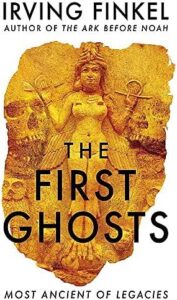 The First Ghosts, Irving Finkel
The First Ghosts, Irving Finkel
This book is an incredibly detailed look at the written sources for some of the most ancient recorded beliefs about ghosts from Sumeria, Babylon and Assyria. It’s a little dense and difficult to read because it excerpts big translated portions (gaps in the text and all) before then explaining them at length — the context is needed to understand things fully, of course, but it feels pretty dry and academic, and (at the same time) it’s difficult to enter into his excitement about his theories because you have to rely on his word about the translations and the comparisons that can be drawn. Scholars in the field must have opinions on it, but the layperson can’t evaluate it — we’re only shown the evidence that supports Finkel’s conclusions.
A major quibble I have is with the author’s conclusion that if you don’t believe in ghosts, you clearly believe that either people who report ghost sightings are lying or mistaken about their own experiences, while the consistency of such reports and the frequency of them suggests that there must be something real there. I think he steps beyond his sources into personal speculation here, while leaning on all his amassed evidence as if it provides proof.
Try this explanation instead: something in the human brain pre-disposes us to have experiences which we interpret in this way. We can stimulate the human brain with electrical currents and magnets, creating sensations which aren’t there — and we know our own brains can produce waves of electrical currents in epilepsy and migraine. So there’s a potential mechanism for you: perhaps sometimes people see “ghosts” because particular experiences and physical states generate an electrical current in a certain part of the brain, producing sensations of things that aren’t really there. They’re then experienced as real and convincing (“I saw it with my own eyes!”), but aren’t.
We know migraine and epilepsy are not uncommon in the population, and we also know that they’re a matter of degree: they’re not on and off, but a spectrum of stimulation leading to a spectrum of presentations. So a large proportion of humanity could have some propensity toward that kind of thing (without having symptomatic epilepsy or migraine or restrict the group who can have these experiences to only people with clinical symptoms).
There. I’ve produced a potential explanation of why ghosts could be regularly reported which tallies with our knowledge of the human brain, which is more testable than Finkel’s hypothesis, and would explain the phenomenon. (It’s not perfect, it’s a little hand-wavy and I’m not actually a neurologist, it’s just an example of a line of investigation that could be taken up based on what we know about the human brain. And like I said, it’s testable.) I’m not saying it’s the truth; what I’m saying is that there are other hypotheses that don’t mean “everyone was lying or didn’t really have the experience they thought they had”. There are, in other words, possible explanations that mean they were all telling the truth and they did really have these convincing experiences that they could not tell apart from reality — they just misattributed the cause.
It feels ridiculous to have this big a pet peeve about it, but it’s very annoying to read a well-evidenced book, get to the end, and then the conclusion is “obviously, ghosts exist because people have always said so, there’s no other possible explanation!”.

That’s such a weird conclusion for Finkel to draw from his evidence, too. Like, it’s kind of out of character with his other work and definitely isn’t within his field to conclude? I, too, can think of another reason for ghosts that isn’t supernatural: humans have more than the traditional 5 senses, like sense of balance, sense of the position of your own body parts, etc. We know some people seem to have a better sense of “north” than others, things like that. What if what gets interpreted as “ghosts” is simply a known sense misfiring, or a sense of something we don’t even know we can sense? Heck, my hearing is good enough to hear electricity, which doesn’t bother me, and people doubt it all the time. If I didn’t know what I was hearing, I could very well misunderstand it and bang, there’s a ghost. Obviously electrical tones don’t apply to ancient Mesopotamia, but it’s just an example.
It was just bizarre to go there! Like… the rest of the book was fairly academic and clear and not “here is my personal opinion about ghosts”, and then suddenly it’s “so obviously ghosts are real.” Wait, what?
Ooh, that would annoy me a lot! I cannot stand the whole “Well obviously it must be true!” line of argument like that. And odd choice for writing a book! It’d surely be better to hint that the author holds these beliefs, but with room for the reader to have their own opinion?
I suppose he thought he had left room for the reader to have their own opinion, he just assumed that any opinion other than his own was “these people must be lying”…